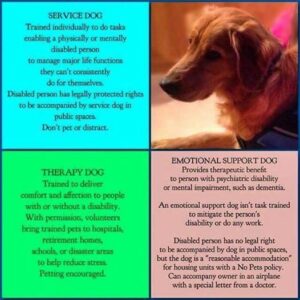 Emotional support dogs can provide much needed comfort and relief to their owners. The animal – human bond is defined as a mutually beneficial and a dynamic relationship between people and animals that is influenced by behaviors essential to the health and well-being of both. It’s no wonder many people have turned to emotional support animals to help with emotional disabilities.
Emotional support dogs can provide much needed comfort and relief to their owners. The animal – human bond is defined as a mutually beneficial and a dynamic relationship between people and animals that is influenced by behaviors essential to the health and well-being of both. It’s no wonder many people have turned to emotional support animals to help with emotional disabilities.
However, dogs come with needs that owners are required to provide. Providing for needs can be overwhelming and stressful. The ability for the owner to provide for these needs should be carefully considered before obtaining an emotional support dog. A dog is not a piece of medical equipment, a book, or a video that can be thrown away if it doesn’t work out.
1. Disability Rights
Disabled individuals may have rights to housing with an emotional support animal even where there is a no-pet policy.
Disability means, with respect to an individual, a physical or mental impairment that substantially limits one or more of the major life activities of such individual, a record of such an impairment, or being regarded as having such an impairment. The phrase major life activities means functions such as caring for one’s self, performing manual tasks, walking, seeing, hearing, speaking, breathing, learning, and working.
While Emotional Support Animals, or Comfort Animals, are often used as part of a medical treatment plan as therapy animals; they are not considered service animals under the ADA. The rights of disabled individuals that use Emotional Support Animals do not include access to public facilities. Disabled persons that use ESAs have no rights to enter restaurants, grocery stores, or other facilities where dogs are prohibited due to health codes or the policy of the owner.
2. Cost
There are many costs involved with owning a dog. Owning an emotional support dog is no different. Veterinary care, nutritious food, supplies like crates, carriers, leashes, collars, harnesses, and toys all add up quickly.
In addition, training is extremely important in emotional support dogs. Although the dog is not required to be trained to do a specific task to assist with a disability, the dog must be well-socialized, must not pose a bite threat to neighbors in common areas, and must not prevent neighbors from the quiet enjoyment of their homes.
3. Responsibility
Dogs and puppies are a huge responsibility. It’s like having a child. Housetraining involves vigilant supervision and rigidly scheduled feedings and potty breaks. Most puppies are confused by pee pads, so if you live in a high rise, it is important to have fake grass on the balcony. It will require many trips through common space for potty breaks. You will need to spend time safely socializing your dog with people, objects, and other animals. You’ll be doing this daily for the first few months. Dogs need exercise and enrichment on a daily basis. Although you could hire a dog walker, that is a big financial commitment.
All of this responsibility could be very stressful. If you are seeking an emotional support dog to relieve stress, you may be in for a big surprise (and not a good one).
4. Suitability
In order to provide emotional support and comfort, the dog must be suitable to be a good family member and safe for everyone around the dog. As a dog trainer, I deal with many dog owners that rescue dogs or even adopt puppies that are totally unsuitable to be good family members and are not safe for interactions with other people and animals. While I find it inspiring that people will provide resources, love, understanding and patience to dogs and puppies with issues, it is extremely stressful for them. Again, if you are looking for a dog to provide comfort and emotional support, there are many dogs that will not be suitable for that. Dogs are feeling, emotional, living beings. They cannot be tossed aside if it doesn’t work out. Due to pet overpopulation, many healthy dogs with good temperament are euthanized simply because there are no homes available for them. Finding a home for a problem dog is very difficult.
There are many ways to relieve anxiety, depression, stress, and other disabilities. A dog is just one therapy and comes with a long list of needs. Owners sign up for a long list of responsibilities when they obtain a dog. If you are unable or unwilling to provide for these needs and fulfill these responsibilities, do not get an emotional support dog.

0 Comments